Filter by

Expansive Discourses Urban Sprawl in Calgary, 1945-1978
A groundbreaking study of urban sprawl in Calgary after the Second World War. The interactions of land developers and the local government influenced how the pattern grew: developers met market demands and optimized profits by building houses as efficiently as possible, while the City had to consider wider planning constraints and infrastructure costs. Foran examines the complexity of their int…
- Edition
- -
- ISBN/ISSN
- -
- Collation
- 284 pages
- Series Title
- -
- Call Number
- -
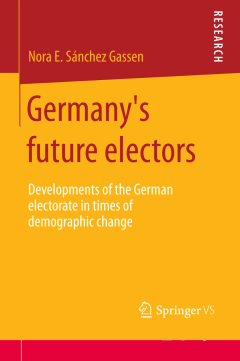
Germany’s future electors
Nora E. Sánchez Gassen analyses how demographic trends and electoral law have influenced the German electorate in the past and projects their future impact. A set of population projections illustrates how the size and age structure of the electorate will change until 2030 due to ongoing demographic changes. Additional analyses reveal how reforms of electoral law and citizenship law could be us…
- Edition
- -
- ISBN/ISSN
- 978-3-658-06941-4
- Collation
- XXIV, 404
- Series Title
- -
- Call Number
- 320 GAS g
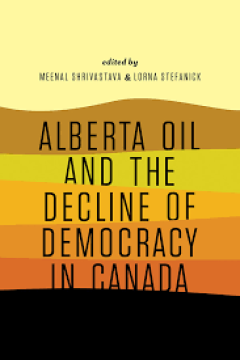
Alberta Oil and the Decline of Democracy in Canada
In probing the impact of Alberta’s powerful oil lobby on the health of democracy in the province, contributors to the volume engage with an ongoing discussion of the erosion of political liberalism in the West. In addition to examining energy policy and issues of government accountability in Alberta, they explore the ramifications of oil dependence in areas such as Aboriginal rights, environm…
- Edition
- -
- ISBN/ISSN
- 9781771990301
- Collation
- -
- Series Title
- -
- Call Number
- -
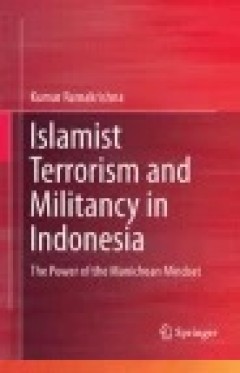
Islamist Terrorism and Militancy in Indonesia: The Power of the Manichean Min…
Drawing upon insights from the natural and social sciences, this book puts forth a provocative new argument that the violent Islamist threat in Indonesia today derives its stubborn resilience from being in essence a complex, adaptive and self-organizing system – or what some specialists might even call a super-organism. The book challenges the popular assumption that ideology is the root caus…
- Edition
- -
- ISBN/ISSN
- 978-981-287-194-7
- Collation
- -
- Series Title
- -
- Call Number
- -
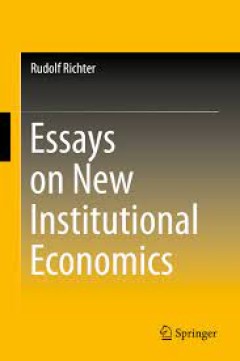
Essays on New Institutional Economics
This collection of essays comprises some of Rudolf Richter’s important contributions to research on New Institutional Economics (NIE). It deals with the central idea, principles, and methodology of New Institutional Economics and explores its relation to sociology and law. Other chapters examine applications of NIE to various microeconomic and macroeconomic issues in the face of uncertainty, …
- Edition
- -
- ISBN/ISSN
- 978-3-319-14154-1
- Collation
- 2 b/w illustrations
- Series Title
- -
- Call Number
- -

International Political Economy : An Introduction to Approaches, Regimes, and…
There are many books on international political economy, or IPE for short. Not surprisingly, each contains its own assumptions and views about the key concepts, issues, and concerns of IPE. Sometimes the authors of these various books hold the same assumptions and share the same, or at least very similar, views about how the world works. Sometimes they don’t. In fact, as we will see in a few …
- Edition
- -
- ISBN/ISSN
- -
- Collation
- -
- Series Title
- -
- Call Number
- 330 LIM i
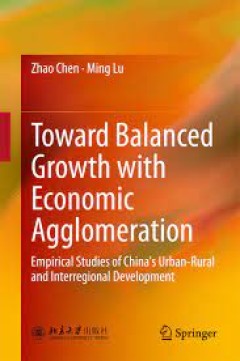
Toward Balanced Growth with Economic Agglomeration
This book explains the relationships between equality and efficiency, as well as between government and market, in urban-rural and regional development by providing theoretical frameworks and empirical evidence. Urban-rural development in China is understood from a regional perspective, while the core issue of urban-rural and regional development is cross-regional resource reallocation driven b…
- Edition
- 1
- ISBN/ISSN
- 978-3-662-47411-2
- Collation
- VII, 138
- Series Title
- -
- Call Number
- -

Epistemology and Political Philosophy in Gilbert Simondon Individuation, Tec…
This combination of historiography and theory offers the growing Anglophone readership interested in the ideas of Gilbert Simondon a thorough and unprecedented survey of the French philosopher’s entire oeuvre. The publication, which breaks new ground in its thoroughness and breadth of analysis, systematically traces the interconnections between Simondon’s philosophy of science and technolog…
- Edition
- -
- ISBN/ISSN
- 978-94-017-9831-0
- Collation
- XI, 251
- Series Title
- -
- Call Number
- -
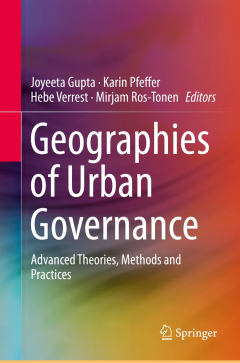
Geographies of Urban Governance
With a current population inflow into cities of 200,000 people per day, UN Habitat expects that up to 75% of the global population will live in cities by 2050. Influenced by forces of globalization and global change, cities and urban life are transforming rapidly, impacting human welfare, economic development and urban-regional landscapes. This poses new challenges to urban governance, while em…
- Edition
- -
- ISBN/ISSN
- 978-3-319-21271-5
- Collation
- XXIX, 235
- Series Title
- -
- Call Number
- 330 GEO
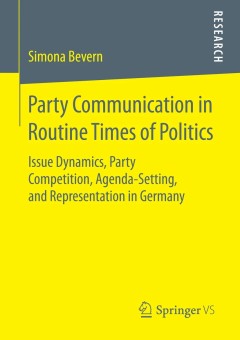
Party Communication in Routine Times of Politics : Issue Dynamics, Party Comp…
Simona Bevern addresses the questions what and why political parties communicate in the time between elections, focusing on the dynamic rise and fall of policy issues. Despite the central role of political parties and the alleged importance of communication, only few scholars have taken a closer look at the content and dynamics of parties’ communication in routine times of politics. In this s…
- Edition
- -
- ISBN/ISSN
- 978-3-658-09205-4
- Collation
- XXI, 233 halaman
- Series Title
- -
- Call Number
- 324.2 BEV p
 Computer Science, Information & General Works
Computer Science, Information & General Works  Philosophy & Psychology
Philosophy & Psychology  Religion
Religion  Social Sciences
Social Sciences  Language
Language  Pure Science
Pure Science  Applied Sciences
Applied Sciences  Art & Recreation
Art & Recreation  Literature
Literature  History & Geography
History & Geography